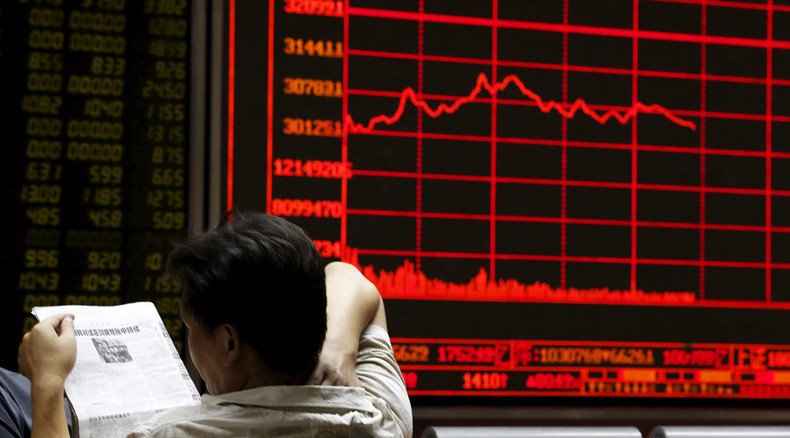Chinese markets crash again in biggest collapse in 20 years

The key Shanghai Composite Index sank another 7.63 percent Tuesday, extending its worst four-day rout since 1996. The index has fallen 22 percent since August 19.
Chinese Stocks Crash Again - Shcomp Closes Below 3000, Down 7.6 Percent http://t.co/XBodosBdqJpic.twitter.com/kg9J8S37cR
— Bloomberg Markets (@markets) 25 августа 2015Investors were rattled as the China Securities Regulatory Commission made no attempt to reassure markets after Monday’s crash, as they did a month ago after an 8.5 percent drop.
READ MORE: China stocks suffer biggest one-day loss in 8yrs, Shanghai Composite drops 8.5%
“It’s panic selling and an issue of confidence,” Wei Wei, an analyst at Huaxi Securities in Shanghai, told Bloomberg News. "The government won’t step in to rescue the market again, as it’s a global selloff and it’s spreading everywhere now. It’s not going to work this time.”
Tokyo’s Nikkei index was again dragged down by Beijing, closing four percent down. Other Asian markets managed to recover after Monday's collapse. Hong Kong's Hang Seng closed under one percent higher, while one of the previous worst-performing markets, Taiwan’s TSEC 50 Index, closed 3.58 percent up.
Sea of green- Relief rally in oil-related stocks in Europe pic.twitter.com/FOZiS7zQ02
— Angelina Rascouët (@arascouet) 25 августа 2015European markets on Tuesday were making a modest recovery after the Black Monday crash. London’s FTSE 100, Germany’s DAX and French CAC 40 were growing by between two to three percent in afternoon trading. In fact, all European equity markets were trading in the green as of 09:00 GMT.
READ MORE: Black Monday: Wall Street plummets 1000 points at opening bell
In the past, China’s central bank has regularly intervened in an effort to revive markets. The People’s Bank of China has spent more than $200 billion buying Chinese stocks since early July.
In August, it prohibited traders from borrowing and repaying stocks on the same day, making it difficult to benefit from hourly price fluctuations in the stumbling market. The state-run China Securities Regulatory Commission (CSRC) announced in July that any shareholder with more than a 5 percent stake in any Shanghai- or Shenzhen-listed company, including foreign investors, should not reduce its holdings over the next six months.
LISTEN MORE:
25 August 2015
11:04 GMTThe People’s Bank of China has lowered its interest rate for the fifth time since November. The one-year lending has been reduced by 25 basis points to 4.6 percent; the one-year deposit rate has been cut by 25 basis points to 1.75 percent. The change comes into force on Wednesday.
China's interest rate move is its fifth cut this year, after a long period of stability http://t.co/ke1kXAAoEEpic.twitter.com/zLlYpMJtaL
— Bloomberg Business (@business) 25 августа 2015













